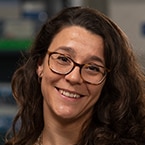AACR-Ocular Melanoma Foundation Career Development Award, in honor of Robert C. Allen, MD
The AACR-Ocular Melanoma Foundation Career Development Award, in honor of Robert C. Allen, MD represents a joint effort to encourage and support early-stage investigators to conduct ocular/uveal melanoma research and establish a successful career path in ophthalmology, ocular oncology, uveal melanoma biology, or a similar field.
2024 grantee

Research
The estimated 5-year survival rate for patients with metastatic uveal melanoma is 16%. Dr. Puig-Saus’ team has developed a new CAR T-cell therapy targeting tyrosinase-related protein 1 (TYRP1) that presents potent and durable antitumor responses in patient-derived models of uveal melanoma and is set to be tested in a phase I clinical trial. Antigen heterogeneity and antigen loss are common resistance mechanisms to CAR T-cell therapy, and dual antigen targeting has been successfully used clinically to avoid this phenomenon. In this grant application, Dr. Puig-Saus plans to reengineer TYRP1 CAR T cells to achieve dual targeting of surface proteins highly co-expressed in ocular melanoma, with the goal of developing a new clinical candidate to treat patients with uveal melanoma.
Biography
Dr. Puig-Saus obtained her doctorate from the University of Barcelona and pursued postdoctoral training at the University of California, Los Angeles (UCLA). As a postdoctoral fellow, she worked on the preclinical and clinical translation of stem cell- and T cell-based cellular therapies. She is currently a tenure-track assistant professor at UCLA, a senior fellow at the Parker Institute for Cancer Immunotherapy, and a member of the Jonsson Comprehensive Cancer Center. Her laboratory is focused on the design and clinical translation of novel T-cell receptor and CAR T-cell therapies for cancer treatment.
Acknowledgment of Support
“We are sincerely thankful for the AACR-Ocular Melanoma Foundation for the Career Development Award, honoring Dr. Robert C. Allen. This grant empowers us to explore new research avenues enhance the clinical benefits of our current CAR T-cell therapy clinical candidate. Our mission is to improve outcomes for patients with uveal melanoma.”
2022 grantee

Research
Uveal melanoma is a rare melanoma subtype associated with poor outcomes in the metastatic setting. Virtually all cases harbor activating mutations of GNAQ, GNA11, PLCB4 or CYSLTR2 which result in activation of the MAP kinase pathway, amongst others. In addition, epigenetic dysregulation is known to play a critical role in disease pathogenesis. Based on preclinical data showing that the combination of MEK inhibition and Bromodomain and Extra-terminal (BET) protein inhibition (an epigenetic regulator) is associated with synergistic anti-tumor activity, Dr. Khan will investigate the safety and efficacy of combined BET and MEK inhibition in a multi-center phase I/II clinical trial in patients with metastatic uveal melanoma. Translational components of this study will assess potential mechanisms of treatment response and resistance using tumor and blood samples from patients.
Biography
Dr. Khan received his medical degree from the New York College of Osteopathic Medicine, after which he completed his training in internal medicine at Medstar Georgetown University Hospital and hematology and medical oncology at Columbia University Medical Center. He is currently an Assistant Professor of Medicine at the Columbia University Herbert Irving Comprehensive Cancer Center. His research is focused on the development of novel therapies for the treatment of cutaneous malignancies, including cutaneous squamous cell carcinoma and uveal melanoma.
Acknowledgment of Support
It is a tremendous honor to be the recipient of the 2022 AACR-Ocular Melanoma Foundation Career Development Award, in honor of Robert C. Allen, MD. This award will be critical as I develop my research career and will be an important resource to facilitate the conduct and analysis of this promising clinical trial.